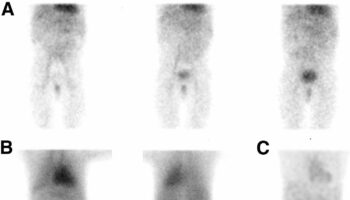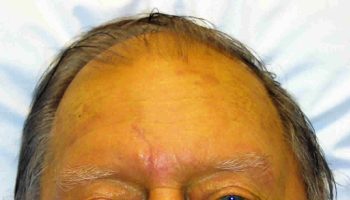Contents
What is thyroid peroxidase
Thyroid peroxidase (TPO) also called thyroperoxidase, is an enzyme normally found in your thyroid gland that plays an important role in the production of thyroid hormones. Thyroid peroxidase enzyme is involved in thyroid hormone synthesis, catalyzing the oxidation of iodide on tyrosine residues in thyroglobulin for the synthesis of triiodothyronine (T3) and thyroxine (T4). Thyroid peroxidase (TPO) is a membrane-associated hemoglycoprotein expressed only in thyroid cells and is one of the most important thyroid gland antigens. A thyroid peroxidase test detects antibodies against thyroid peroxidase in the blood. If you’ve been diagnosed with thyroid disease, your doctor may recommend a thyroid peroxidase antibody test — in addition to other thyroid tests — to help determine the cause. The thyroid gland is part of your endocrine system, which produces hormones that coordinate many of your body’s functions.
What is thyroid peroxidase antibody
Thyroid peroxidase antibody is an antibody against thyroid peroxidase (anti-TPO), an enzyme normally found in the thyroid gland that plays an important role in the production of thyroid hormones. Thyroid peroxidase antibody is most common test for autoimmune thyroid disease; it can be detected in Graves disease or Hashimoto thyroiditis. In autoimmune disorders, your immune system makes antibodies that mistakenly attack normal tissue. Antibodies that attack the thyroid gland cause inflammation and impaired function of the thyroid.
The highest thyroid peroxidase antibody (anti-TPO) levels are observed in patients suffering from Hashimoto thyroiditis. In Hashimoto’s disease, the prevalence of thyroid peroxidase antibodies is about 90% of cases, confirming the autoimmune origin of the disease. These thyroid peroxidase antibodies also frequently occur (60 to 80%) in the course of Graves disease.
In patients with subclinical hypothyroidism (underactive thyroid), the presence of thyroid peroxidase antibodies is associated with an increased risk of developing overt hypothyroidism. Many clinical endocrinologists use the thyroid peroxidase antibody test as a diagnostic tool in deciding whether to treat a patient with subclinical hypothyroidism.
Your doctor may also order a thyroid peroxidase antibody test if you are pregnant and have an autoimmune disease, especially one that involves the thyroid, such as Hashimoto’s disease or Graves’ disease.
Some people with thyroid peroxidase antibodies may not have thyroid disease. However, the presence of thyroid peroxidase antibodies may increase the risk of future thyroid disorders. If you have normal thyroid function with thyroid peroxidase antibodies, your doctor may recommend periodic checkups to watch for future thyroid problems.
Hashimoto’s disease is an autoimmune disorder in which your immune system attacks your thyroid gland that can cause hypothyroidism, or underactive thyroid. The thyroid becomes damaged and can’t make enough thyroid hormones. Inflammation from Hashimoto’s disease, also known as chronic lymphocytic thyroiditis, often leads to an underactive thyroid gland (hypothyroidism). Hashimoto’s disease is the most common cause of hypothyroidism in the United States. It primarily affects middle-aged women but also can occur in men and women of any age and in children. Treatment of Hashimoto’s disease with thyroid hormone replacement usually is simple and effective.
Graves’ disease is an immune system disorder that results in the overproduction of thyroid hormones (hyperthyroidism). Although a number of disorders may result in hyperthyroidism, Graves’ disease is a common cause. Because thyroid hormones affect a number of different body systems, signs and symptoms associated with Graves’ disease can be wide ranging and significantly influence your overall well-being. Although Graves’ disease may affect anyone, it’s more common among women and before the age of 40. The primary treatment goals for Graves’ disease are to inhibit the overproduction of thyroid hormones and lessen the severity of symptoms.
Thyroid peroxidase antibodies normal range
Thyroid peroxidase antibody normal range <9.0 IU/mL
The reference values apply to all ages.
Thyroid peroxidase antibodies high
Values above 9.0 IU/mL generally are associated with autoimmune thyroiditis, but elevations are also seen in other autoimmune diseases.
In patients with subclinical hypothyroidism, the presence of thyroid peroxidase antibodies predicts a higher risk of developing overt hypothyroidism, 4.3% per year versus 2.1% per year in antibody-negative individuals. Furthermore, it raises the concern that such patients may be at increased risk of developing other autoimmune diseases, such as adrenal insufficiency and type 1 diabetes.
The frequency of detectable anti-thyroid peroxidase observed in non-immune thyroid disease is similar to the 10% to 12% observed in a healthy population with normal thyroid function.
There is a good association between the presence of autoantibodies against thyroid peroxidase and histological thyroiditis. However, in view of the extensive regenerative capacity of the thyroid under the influence of thyroid-stimulating hormone, chronic thyroid disease may be present for years before the clinical manifestation of hypothyroidism becomes evident, if ever.
Cautions
Moderately increased levels of thyroid peroxidase antibodies may be found in patients with non-thyroid autoimmune disease such as pernicious anemia, type 1 diabetes, or other disorders that activate the immune system.
Some patients who have been exposed to animal antigens, either in the environment or as part of treatment or imaging procedure, may have circulating anti-animal antibodies present. These antibodies may interfere with the assay reagents to produce unreliable results.





